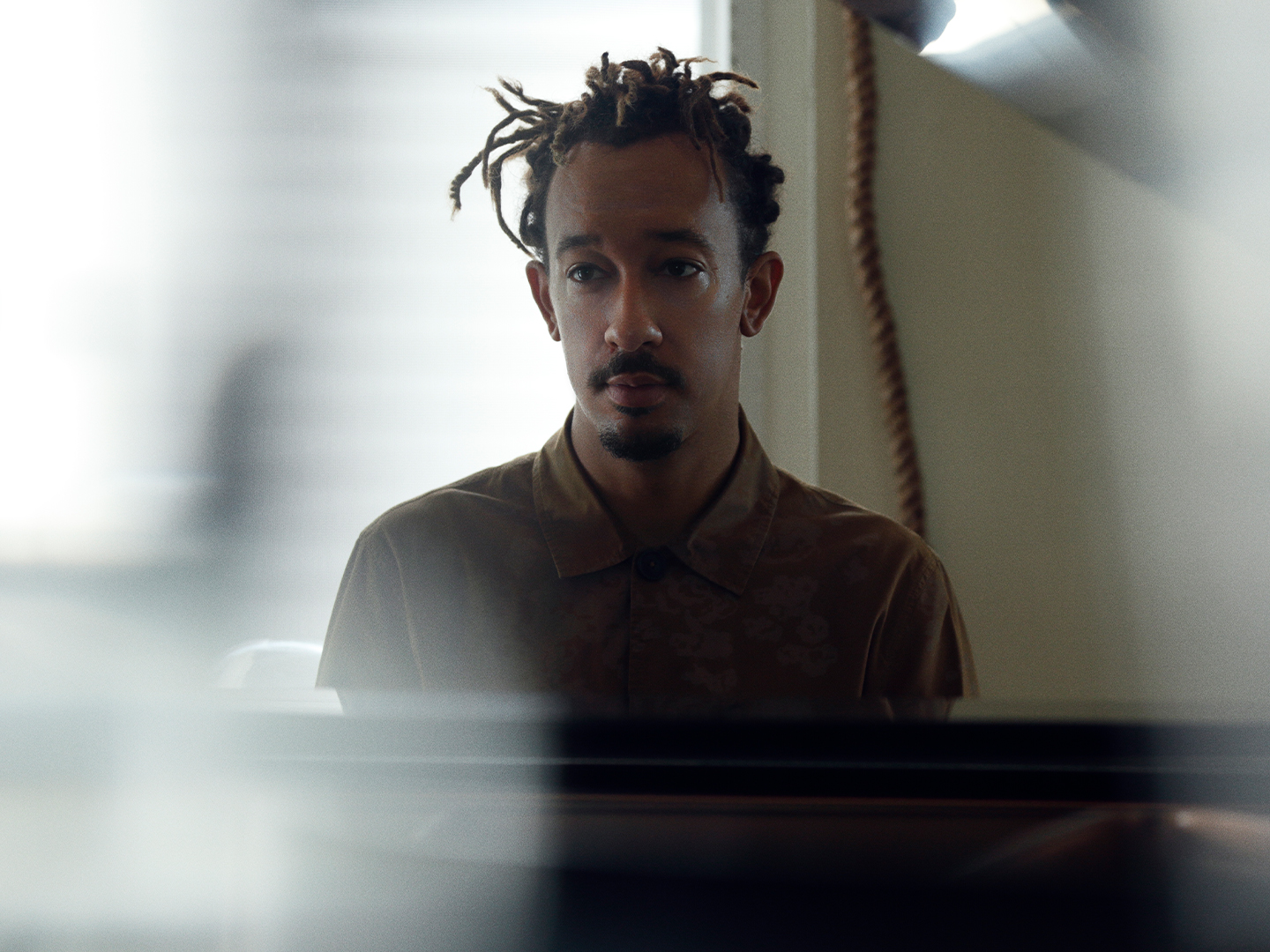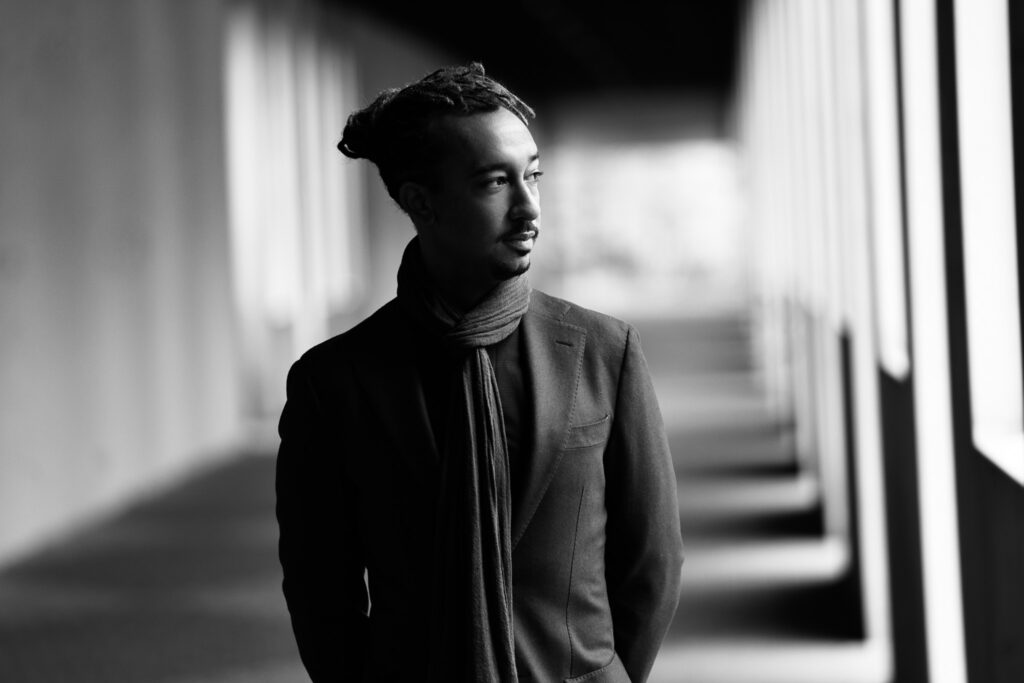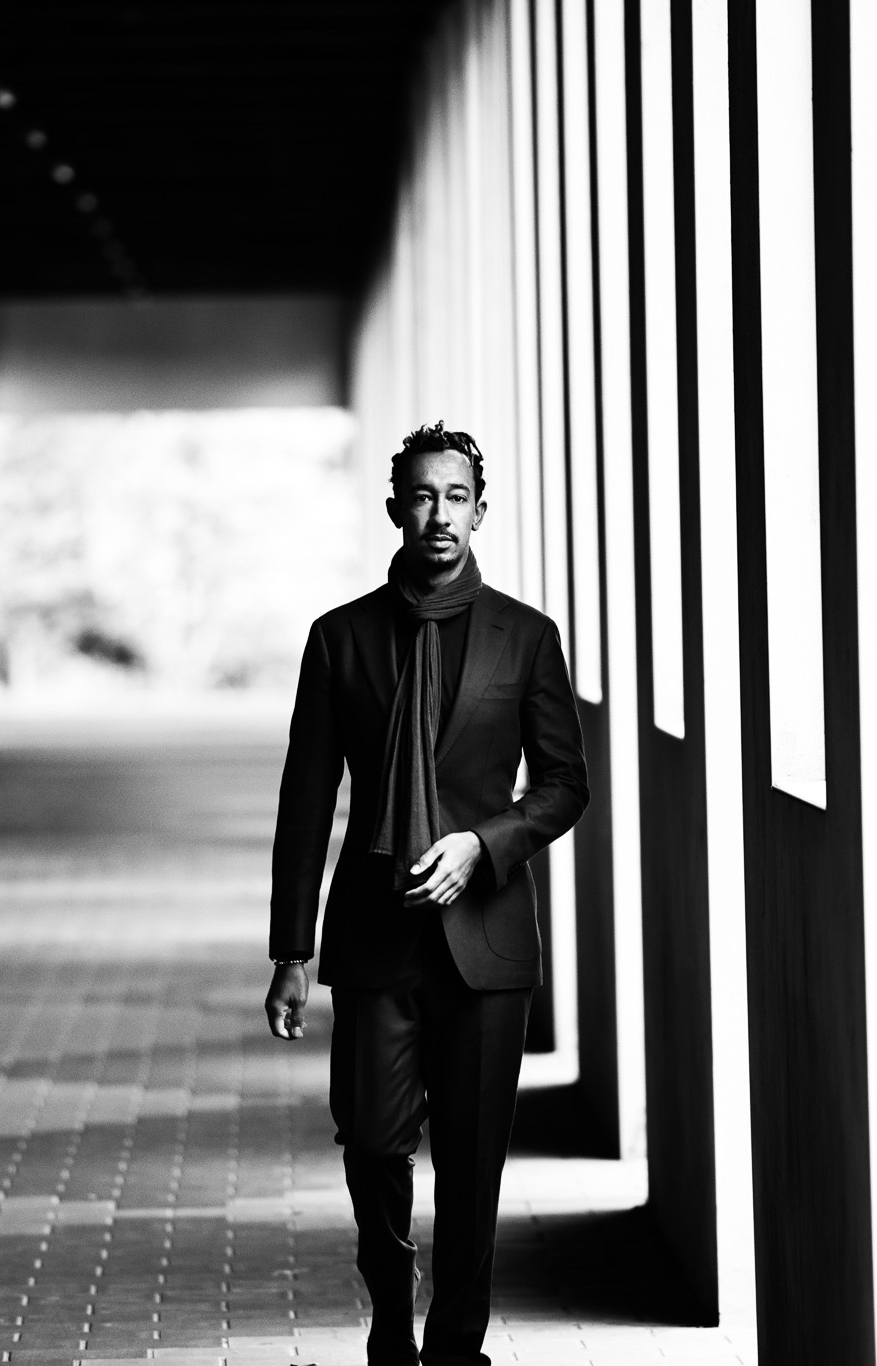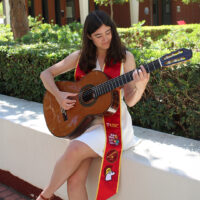
Jazz Innovator Named an Artist-in-Residence
By Julie Riggott
Acclaimed jazz pianist/composer Gerald Clayton (’07) returns to USC Thornton as a role model for the next generation.

When he signed jazz pianist and composer Gerald Clayton (BM ’07) to Blue Note Records in 2020, celebrated producer Don Was extolled his musicianship, saying, “Gerald Clayton is one of the most accomplished, distinctive and innovative pianists performing today.”
The Recording Academy and the American Society of Composers, Authors and Publishers (ASCAP) have also recognized his brilliance. A six-time GRAMMY-nominated artist, Clayton was honored with the 2018 ASCAP Vanguard Award for his innovative work helping to shape the future of music.
A quintessential artist and role model for the next generation of jazz musicians, Clayton will share his extraordinary talents with USC Thornton students as a 2024-2025 Artist-in-Residence in Jazz.
“It’s a great honor. I’m really touched and encouraged to double down and work hard to try to do the best job I can,” Clayton said. “But being a Thornton alumnus, there’s something kind of full circle and really special about this moment.”
“We’re thrilled to welcome Gerald Clayton back to the USC Thornton School of Music as a 2024-2025 Artist in Residence in Jazz,” said USC Thornton Dean Jason King. “He’s one of the most visionary jazz pianists working today, and he brings thoughtfulness, creativity, and great insight to everything he does. He’s bound to have a major impact on our students—not only in the time he spends mentoring and instructing them, but also in the way he serves as a living example of a top-flight artist who has carved out artistic and critical success on his own terms.”
As an Artist-in-Residence in Jazz, Clayton will teach classes on improvisation, ensemble performance, and composition as well as providing private instruction.
“I’m really excited to get into the weeds with these students,” Clayton said. “I find that this generation of hungry young musicians is more talented than ever. Since the Information Technology Age, the rate at which young adults process information and soak it in is just astoundingly fast. That means we can get to some deeper topics and deeper nuances of the music.
“But there is this sort of mystical element of music that no matter how talented you are, how fast you can shred on the instrument, it doesn’t mean that you can effectively pull at the heartstrings of the listener,” he added. “So that requires a deep dive into the music, into the examples of the great music that we have, and trying to make sense of it for ourselves. So, I’m just stoked to be a part of that process with the young musicians.”
The key, Clayton says, is seeking honest expression in every note. Listen to his “Peace Invocation” and prepare to have those heartstrings pulled.
Clayton’s virtuosity was recognized right out of the gate by the Recording Academy. His debut recording, Two Shade (ArtistShare), earned a 2010 GRAMMY nomination for Best Improvised Jazz Solo for his arrangement of Cole Porter’s “All of You.”
Successive years brought three more GRAMMY nominations. “Battle Circle,” Clayton’s composition on The Clayton Brothers’ (uncle Jeff Clayton and father John Clayton) recording The New Song and Dance (ArtistShare), received a nomination for Best Jazz Instrumental Composition in 2011. And he earned nominations for Best Jazz Instrumental Album for his second and third album releases, Bond: The Paris Sessions (Concord) and Life Forum (Concord).
Lifelong Musical Training
Clayton formally began his musical training at the prestigious Los Angeles County High School for the Arts, where he received the 2002 Presidential Scholar of the Arts Award. After a year of intensive study with NEA Jazz Master Kenny Barron at the Manhattan School of Music, he came to USC Thornton, where he studied with Billy Childs (BM 1979) in the Jazz Studies department and earned a Bachelor of Music in piano performance in 2007. As an undergraduate, Clayton won second place in the 2006 Thelonious Monk Institute of Jazz Piano Competition.
“Being at Thornton was a special time of great growth for me,” he said, acknowledging his professors and the camaraderie of the community in which like-minded students explored new ideas, learned from each other, and built lifelong relationships.
Especially impactful were his private studies with Childs, who is a piano icon, one of the foremost American composers of his era, a five-time GRAMMY winner with 13 nominations and a USC Thornton Composition alumnus.
“Billy pushed me to take a dive into a depth of composition that I was really daunted by before, and scared of frankly, and he just kind of pushed me off the deep end,” Clayton said. “I explored one of his many compositional approaches and processes, and that is something that I still think about when I’m writing music or arranging music. His approach is unique, complex and thorough, really deep, and just to spend time with him and to get his feedback was an experience I really cherish.”

Clayton has also enjoyed a special musical apprenticeship his entire life—with his father, the renowned jazz bassist, composer, arranger and producer John Clayton. A GRAMMY winner with nine additional nominations, John Clayton has written and/or recorded with artists as diverse as Paul McCartney, Diana Krall, Gladys Knight, Queen Latifah and Yo-Yo Ma. An educator as well as an artist, he taught on the USC Thornton faculty between 1988 and 2009.
“I count my blessings every day, to have grown up around the music so closely, in a community of music, to have a shining example of how to successfully live in service of the music and still support a family of four,” Clayton said about his father. “My dad has a resilient positivity, but also a very dedicated focus and drive that I was also lucky to grow up around. Our relationship is one of mutual respect and love.”
Clayton says he and his father perform together and bounce ideas off each other all the time, and he draws inspiration from his father as an educator.
“Certainly, in the education sphere, I’m always jumping on his shoulders and taking the things that he taught me and passing them on—which are really values of service to the music, that the less we focus on ourselves and the more we focus on what the music is asking of us, the more we’re on the right path.”
A Role Model

Clayton has performed with a long list of jazz musicians and has enjoyed an extensive collaboration with saxophone legend Charles Lloyd, touring and recording on three Blue Note albums.
In 2015-2016, Clayton was musical director of the Monterey Jazz Festival On Tour, a project that featured his trio along with Ravi Coltrane, Nicholas Payton, Terence Blanchard and Raul Midón. 2020 was the first year he served as director of the Monterey Jazz Festival’s Next Generation Jazz Orchestra, leading a big band of all-star high school students in performance at the festival.
Clayton explored the “Piedmont Blues” experience in a Duke University commission in 2016-2017. For his evening-length composition inspired by African-American artists in the Carolinas during Jim Crow, he created a live concert and multimedia presentation, featuring vocalist Rene Marie, gospel choir, two tap dancers and a nine-piece band, as well as film, new and archival photography and folklore.
This year, Clayton completed a 35-date North American tour with the Blue Note Quintet in celebration of the label’s 85th anniversary. The all-star collective featured Clayton as musical director and pianist, alto saxophonist Immanuel Wilkins, vibraphonist Joel Ross, drummer Kendrick Scott and bassist Matt Brewer. Clayton’s album, Bells on Sand, was released by Blue Note in 2021.
Given his celebrated career, what does Clayton consider essential for success?
“A positive outlook. Be kind and loving to those around you, be humble and grateful — those are definitely elements that do everybody good,” he said.
“I think the main thing does circle back to that lesson of my dad’s: to take care of music and serve the music. If that’s your North Star, everything else takes care of itself. So, really see your role as one of service, and do that with integrity, with focus and honesty, and the rest just kind of comes along for the ride.”
Featured photo by Ogata

